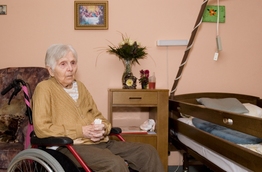People with dementia undiagnosed because they don't visit their doctor, Alzheimer's Society survey reveals

Don’t be afraid to visit your GP if you’re suffering the symptoms of memory loss is the message from Alzheimer's Society as it revealed that two thirds of GPs say many people living with dementia are not being diagnosed because they do not make an appointment to see their doctor.
The Alzheimer’s Society surveyed 382 GPs to provide insight into why diagnosis rates are so low, as currently just 43 per cent of people with the condition in the UK are diagnosed.
The survey is published a month after David Cameron committed to the first ever Prime Minister’s challenge on dementia, pledging to help drive up diagnosis rates. Currently diagnosis rates vary a great deal across the nations, ranging from 70 per cent in Belfast to 27 per cent in Dorset.
Alzheimer’s Society is urging anyone who is concerned about memory loss to speak to their doctor and contact the charity for more information, as part of its ‘Worried about your memory?’ campaign.
The charity is also encouraging GPs to display its ‘Worried about your memory?’ leaflets prominently in surgeries. More than 100,000 people contacted the charity directly last year as a result of the campaign. Jeremy Hughes, chief executive of Alzheimer's Society, said: “This survey gives us vital clues into why thousands of people with dementia are still struggling without a formal diagnosis.
“We all forget things now and again but if memory loss is starting to interfere with your daily life, it’s really important not to just ignore it. If someone does have dementia, then it is best to know as soon as possible. They can then access potential treatments, support and plan for the future, along with their family.
“People not going to their GP is likely to be only part of the picture. To drive up diagnosis rates, we also need to tackle stigma, raise awareness of possible treatments and support, and ensure GPs are better geared up to support people.”
Alzheimer's Society supporter and TV health expert, Dr Hilary Jones, said: “From a GP’s point of view, we need people to come and talk to us if they are regularly forgetting things, or if someone they love is. Only then can we support people through the process of finding out why this is happening. It can seem scary talking about memory problems, but people with dementia often tell us diagnosis is actually a relief, and means they can start taking control and making decisions.”
Jill Batty’s husband Dominic was diagnosed with Alzheimer’s disease in 2003 when he was 74 years old. Jill, 66 from London, said: “In my experience, an early diagnosis makes such a difference to the quality of life of the person with dementia and their loved ones. Because Dominic was diagnosed early on, he was able to fully benefit from treatments and support. I think the best thing to do if you are concerned about your memory is to take that first step of talking to your GP.”
The survey also found:
•88 per cent of GPs agreed there were benefits to an early diagnosis of dementia
Those GPs that agreed there were benefits to an early diagnosis said these benefits included:
•Giving you time to plan for the future (84 per cent)
•Access to treatments (78 per cent)
•Helping to improve quality of life (74 per cent)
•Access to care pathways (69 per cent)
For more information and to download the ‘Worried about your memory?’ leaflet, visit alzheimers.org.uk/memoryworry
Latest News
 29-Jul-24
Dementia Bus gives carehome.co.uk staff insight into life with dementia
29-Jul-24
Dementia Bus gives carehome.co.uk staff insight into life with dementia
 01-Mar-24
Find out the top care homes in 2024
01-Mar-24
Find out the top care homes in 2024
 21-Mar-23
UK's top care homes in 2023 revealed
21-Mar-23
UK's top care homes in 2023 revealed
 03-Jan-23
carehome.co.uk launches free care helpline
03-Jan-23
carehome.co.uk launches free care helpline
 13-Dec-22
5 mins with Emily Whitehurst, chief operating officer for Constantia Healthcare
13-Dec-22
5 mins with Emily Whitehurst, chief operating officer for Constantia Healthcare